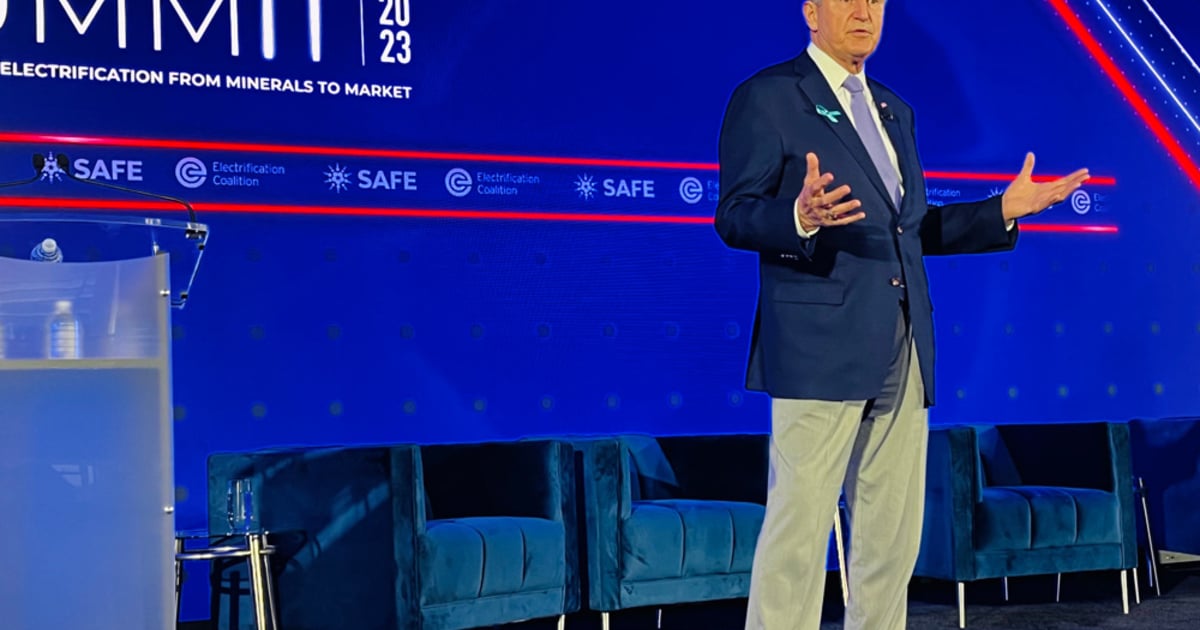
WASHINGTON — Sen. Joe Manchin is once again criticizing the U.S. Treasury Department for how it is implementing the Inflation Reduction Act’s tax credit for new electric vehicles.
In public comments submitted Sunday to Treasury, the West Virginia Democrat further detailed his concerns over the department’s handling of the provision known as Section 30D, arguing that it “has seriously misconstrued the plain language and clear purpose of the critical minerals and battery component requirements.”
Manchin, who chairs the Senate Energy and Natural Resources Committee, said proposed guidance released by Treasury in March “deviates from the will of Congress in at least three major respects,” including its interpretation of the critical mineral requirement and free-trade agreement.
“My comment is simple: Follow the law,” he wrote in an 11-page letter to Treasury, explaining that the tax credit’s purpose is “no longer to promote the purchase and use of [EVs] … but to promote reliable domestic supply chains for the critical minerals and battery components” needed to power them.
The revamped consumer incentive offers $3,750 for EVs that have at least 40 percent of the value of the battery’s critical minerals extracted or processed in the U.S. or in a country where the U.S. has a free-trade agreement, or from materials that were recycled in North America. Another $3,750 is available if at least half the value of the EV’s battery components are made or assembled in North America.
Those percentages ramp up over time, maxing out at 80 percent in 2027 for minerals and 100 percent in 2029 for battery components.
Starting in 2024, vehicles are ineligible if they contain any battery components manufactured by a “foreign entity of concern,” which could include companies controlled by China. That exclusion starts in 2025 for critical minerals. Treasury still needs to release guidance on how strictly it will enforce the provision.
Manchin’s latest grievances come after he threatened to sue Treasury in March over how it was planning to interpret the critical mineral and battery component provisions.
In the more detailed submitted comments, Manchin said Treasury’s proposal creates an “unauthorized and unlawful” test for determining whether the critical minerals requirement is met that “undermines the statutory test even further by halving the statutory percentages.”
Under Treasury’s proposal, Manchin argues, “if as little as 50 percent of the value of either extraction or processing is added in the United States or a free-trade agreement country, that suffices to treat the entire value of extraction or processing as if it occurred in the United States.”
Treasury’s proposed guidance also gave automakers some leeway in meeting the rules by treating anode and cathode active materials as processed critical minerals — or “constituent materials” — rather than as battery components, enabling those materials to be sourced outside North America and with free-trade partners.
However, Manchin argues that Treasury’s interpretation of constituent materials is another “major deviation” from the law’s congressional intent and discourages investments in domestic production of battery components.
Lastly, the senator called into question Treasury’s definition of free-trade agreement, asserting that it is “crossing lines drawn by Congress” in the law by allowing the recent critical minerals agreement with Japan to count.
“A ‘free-trade agreement’ is an agreement between two or more countries in which each removes tariff and other restrictions on ‘substantially all’ trade between the parties, not just a mineral here or a mineral there,” he wrote.
Treasury did not immediately respond to a request for comment.
The public comment period on the proposed guidance ends Friday.